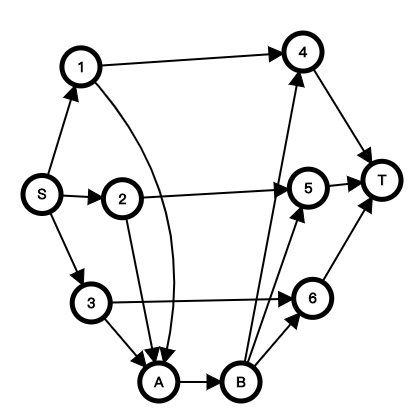题目大意
给定两个长度为 $n$ 的正整数序列 $\{a_i\}$与 $\{b_i\}$,序列的下标为 $1, 2, \cdots , n$。现在你需要分别对两个序列各指定恰好$K$ 个下标,要求至少有 $L$ 个下标在两个序列中都被指定,使得这 $2K$ 个下标在序列中对应的元素的总和最大。
$n \leq 2\times 10^5,\sum _n \leq 10^6$
题解
模拟费用流真奇妙
首先考虑这个题如何用网络流解决。

然后在 $A \to B$ 上限制有多少对不一样就好了。发现只能有 $K-L$ 对不同。
这样就能得到可能是 64 分的好成绩了。
考虑我们如何去模拟这个费用流。
如果当前 $A \to B$ 还有流量的话我们就可以从左边没选的选个最大的,右边没选的也选个最大的,组合起来。
如果没有流量的话,就要分情况讨论:
- 直接选能通过中间的边的一对(比如 $1$ 和 $4$)
- 找到一个左边的没被选 但是对应右边被选的点 我们让左边被选上 那么为了保持流量平衡 右边需要从没被选的点中选一个。反过来同理
注意都要更新是不是会导致 $A \to B$ 的流量增加。
所以拿堆维护未被选左边/右边点的值,对应点被选的左边/右边的值,一对都没被选的值即可。
细节有点多 还有点卡常 zbl
#include<bits/stdc++.h>
#define fi first
#define se second
#define U unsigned
#define P std::pair<int,int>
#define LL long long
#define pb push_back
#define MP std::make_pair
#define all(x) x.begin(),x.end()
#define CLR(i,a) memset(i,a,sizeof(i))
#define FOR(i,a,b) for(register int i = a;i <= b;++i)
#define ROF(i,a,b) for(register int i = a;i >= b;--i)
#define DEBUG(x) std::cerr << #x << '=' << x << std::endl
inline char nc(){
#define SIZE 1000000+3
static char buf[SIZE],*p1 = buf+SIZE,*p2 = buf+SIZE;
if(p1 == p2){
p1 = buf;p2 = buf+fread(buf,1,SIZE,stdin);
if(p1 == p2) return -1;
}
return *p1++;
#undef SIZE
}
template <typename T>
inline void read(T &x){
x = 0;int flag = 0;char ch = nc();
while(!isdigit(ch)){
if(ch == '-') flag = 1;
ch = nc();
}
while(isdigit(ch)){
x = (x<<1) + (x<<3) + (ch^'0');
ch = nc();
}
if(flag) x = -x;
}
const int MAXN = 2e5 + 5;
int a[MAXN],b[MAXN],n,K,L;
struct A{
int id;
A(int id=0) : id(id) {}
bool operator < (const A &t) const {
return a[id] < a[t.id];
}
};
struct B{
int id;
B(int id=0) : id(id) {}
bool operator < (const B &t) const {
return b[id] < b[t.id];
}
};
struct AB{
int id;
AB(int id=0) : id(id) {}
bool operator < (const AB &t) const {
return a[id]+b[id] < a[t.id]+b[t.id];
}
};
std::priority_queue<A> q1,p1;//单纯 A | B 被占
std::priority_queue<B> q2,p2;// 单纯 B | A 被占
std::priority_queue<AB> q;//一群
int flow,st[MAXN],id[MAXN];LL ans;
inline void clear(){
while(!q1.empty()) q1.pop();while(!p1.empty()) p1.pop();
while(!q2.empty()) q2.pop();while(!p2.empty()) p2.pop();
while(!q.empty()) q.pop();flow = 0;
FOR(i,1,n) st[i] = 0,id[i] = i;ans = 0;
}
inline void pop(){
while(!q1.empty() && (st[q1.top().id]&1)) q1.pop();
while(!q2.empty() && (st[q2.top().id]&2)) q2.pop();
while(!q.empty() && st[q.top().id]) q.pop();
while(!p1.empty() && st[p1.top().id] != 2) p1.pop();
while(!p2.empty() && st[p2.top().id] != 1) p2.pop();
}
inline void gao1(){
flow--;
int x = q1.top().id,y = q2.top().id;
ans += a[x]+b[y];
st[x] |= 1;st[y] |= 2;
if(st[x] == 1) p2.push(B(x));
if(st[y] == 2) p1.push(A(y));
if(x == y) flow++;
else flow += (st[x]==3)+(st[y]==3);
}
inline void gao2(){
int t1=-2e9,t2=-2e9,t3=-2e9;
if(!p1.empty() && !q2.empty()) t1 = a[p1.top().id]+b[q2.top().id];
if(!p2.empty() && !q1.empty()) t2 = b[p2.top().id]+a[q1.top().id];
if(!q.empty()) t3 = a[q.top().id]+b[q.top().id];
int mx = std::max(std::max(t1,t2),t3);
if(mx == -2e9) return;
ans += mx;
if(mx == t1){
int x = p1.top().id,y = q2.top().id;
st[x] |= 1;st[y] |= 2;
if(st[y] == 3) flow++;
else p1.push(A(y));
return;
}
if(mx == t2){
int x = q1.top().id,y = p2.top().id;
st[x] |= 1;st[y] |= 2;
if(st[x] == 3) flow++;
else p2.push(B(x));
return;
}
if(mx == t3){
int x = q.top().id;
st[x] |= 3;return;
}
}
inline void Solve(){
read(n);read(K);read(L);
FOR(i,1,n) read(a[i]);FOR(i,1,n) read(b[i]);
clear();
std::sort(id+1,id+n+1,[](int x,int y){return a[x] > a[y];});
FOR(i,1,K-L) ans += a[id[i]],st[id[i]] |= 1;
std::sort(id+1,id+n+1,[](int x,int y){return b[x] > b[y];});
FOR(i,1,K-L) ans += b[id[i]],st[id[i]] |= 2;
FOR(i,1,n){
if(st[i] == 0) q1.push(A(i)),q2.push(B(i)),q.push(AB(i));
if(st[i] == 1) q2.push(B(i)),p2.push(B(i));
if(st[i] == 2) q1.push(A(i)),p1.push(A(i));
if(st[i] == 3) flow++;
}
while(L--){
pop();
if(flow) gao1();
else gao2();
}
printf("%lld\n",ans);
}
int main(){
int T;read(T);
while(T--) Solve();
return 0;
}
2 comments
切这题是真滴强
所以您是真的强